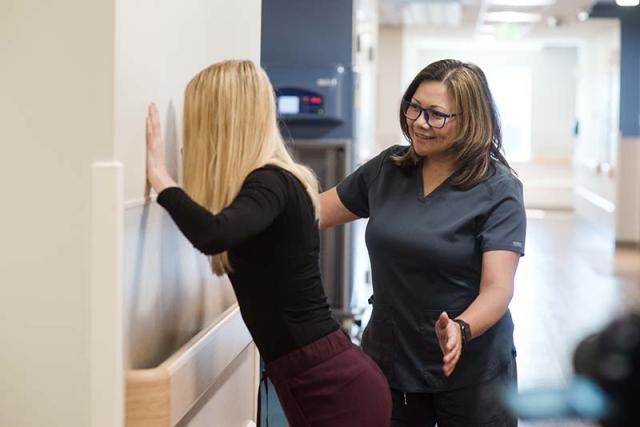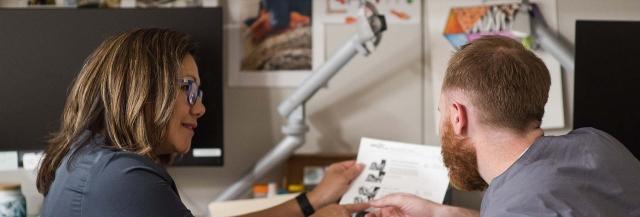
Specialized and Evidence-Based Treatment
Treating severe and complex eating disorders and progressive malnutrition from illness or infection requires a specialized, individualized and evidence-based approach. Few providers are trained to effectively treat patients with severely low body weight and/or medical instability from malnutrition and purging or restore them to a safe Body Mass Index to continue recovery.
ACUTE fuses expert medical and behavioral care in its highly sophisticated system of care, the only unit of its kind in the United States exclusively focused on extreme forms of these diseases. ACUTE saves lives, reduces suffering, and prepares patients for successful transition to the next appropriate level of care, usually an inpatient behavioral treatment center, or in the case of patients with severe malnutrition, returning to their providers—or continue—a lifesaving treatment.

System of Care
-
Internal Medicine
No system of the body is immune from the ravages of an extreme eating disorder or severe malnutrition. ACUTE founder and CEO Dr. Philip Mehler is the preeminent international expert on effective medical treatment of eating disorders and medically supervised refeeding for severe malnutrition from infection or disease. Having written over 625 scholarly pieces on this specialty, Dr. Mehler leads a team of ACUTE internists with deep and specific medical expertise in refeeding and managing attendant medical complications. ACUTE’s medical capabilities also allow for concurrent treatment of any co-occurring medical diagnoses (ie. diabetes, cancer and infections) as well as medically supervised substance detox.
-
Psychiatry
Psychiatric symptoms of eating disorders can include behavioral challenges and comorbid diagnoses including depression, anxiety, obsessive compulsive disorder and substance use disorder. In patients with severe malnutrition (non-eating disorder), mental health concerns from living with serious, chronic illness may include depression and anxiety, and must be addressed alongside medically supervised refeeding. ACUTE’s psychiatrists deliver individualized medication management to patients on the unit, and work with the larger treatment team to identify appropriate discharge plans that meet patients’ medical and behavioral support needs.
-
Nursing
As a medical telemetry unit, ACUTE has robust medical capabilities to keep patients safe, begin refeeding and nutritional rehabilitation and promote healing. ACUTE’s compassionate, full-time nurses specialize in eating disorders and severe malnutrition treatment and are dedicated to the unit. They bring a depth of understanding of medical complications of eating disorders and malnutrition, as well as skills to manage patients’ behavioral complexity while executing upon the medical treatment plan.
-
Medical Support & 1:1 Supervision
Certified Nursing Assistants (CNAs) and Behavioral Health Technicians (BHTs) deliver 24-hr, 1:1 observation/monitoring for behaviors and patient safety. They support safe mobility and transfers (into bed, to bathroom, etc.), and provide valuable engagement and encouragement to help patients feel human. ACUTE’s unmatched 1:1 supervision model is made possible by room-based treatment. ACUTE’s unit is comprised of 30 private patient rooms (each with a private bathroom). Benefits of room-based treatment include better rest, safety of patients and staff, infection control and social distancing, mobility concerns and reduced shame and embarrassment from complications of refeeding such as flatulence, diarrhea, etc.
-
Other Medical Specialties
As a private unit within Denver Health Medical Center, a nationally ranked academic medical center, ACUTE can utilize experts from other specialty departments to address any patient need. Specialists from Endocrinology, Infectious Disease, Oncology, Gastroenterology, Adolescent Medicine and other disciplines spend considerable time on the unit, working alongside ACUTE’s medical providers to treat all issues while patients benefit from continuity of care for their eating disorder and malnutrition.
-
Dietary
ACUTE’s highly skilled dietitians collaborate closely with medical teams to plan and administer appropriate refeeding and nutritional rehabilitation. Because of ACUTE’s extensive medical capabilities, dietitians can utilize any method of feeding on the unit, including tube feeding for severe eating disorders, enteral and parenteral nutrition when oral feeding is not indicated. Dietitians work with patients to select meal plans that accommodate their unique caloric needs, and provide support to patients as they eat their meals in their private rooms to prevent eating disorder behavior.
-
Physical Therapy
Medical complications of extreme eating disorders and severe malnutrition can impair mobility and challenge engagement in everyday activities. Many patients find themselves too weak to get out of bed; some are wheelchair bound, some may experience frequent falls, while others lack the strength to engage in basic self-care and the activities of daily living. Physical therapy at ACUTE addresses the life-limiting strength and mobility challenges caused by very low body weight, and prepares them to engage in the next level of care, which generally requires mobility and self-care abilities.
-
Psychology
Even in patients whose brains are starved, therapy can be a beneficial behavioral intervention alongside medical stabilization and weight restoration. Patients are seen individually by a Certified Eating Disorders Specialist (CEDS) psychologist in their private room. Patients typically cannot endure more than 20 minutes of therapy at admission due to compromised health and cognitive impairment; as patients stabilize and become nourished, they can generally tolerate more therapy and sessions may increase to 40-60 minutes as appropriate. At this therapeutic stage, skill development is emphasized and trauma work and group therapy is discouraged.
-
Occupational Therapy
Restoring motivation and capabilities through occupational therapy is a valuable intervention at ACUTE. It may be a necessary precursor to transitioning to a residential treatment center or next appropriate level of care to ensure that patients can meaningfully engage in a schedule of activities and practice self-care. Patients also work with occupational therapists to explore leisure occupations, which can shift unhealthy preoccupation with disordered eating and body image thoughts toward a healthier focus.
-
Religious, Spiritual and Cultural Support
Optional nondenominational religious and spiritual support are available to ACUTE patients. Many patients facing life-threatening medical complications from eating disorders or progressive malnutrition stemming from disease or infection find peace and healing in the comfort of prayer. ACUTE’s dedicated chaplain is available to all patients, and works closely with the larger treatment team to meet patients’ unique spiritual, religious and cultural treatment needs.
-
Social Work/Discharge Planning
The medically and psychiatrically complex patients who meet admission criteria for ACUTE require thoughtful discharge planning that accounts for their ongoing recovery needs. Most patients with an existing treatment team will be returned to their referring providers to continue recovery. In some cases, an interim level of care may be appropriate to maintain medical gains achieved at ACUTE, and this decision is discussed collaboratively with referring professionals, patients and families based on the best interest of recovery.
